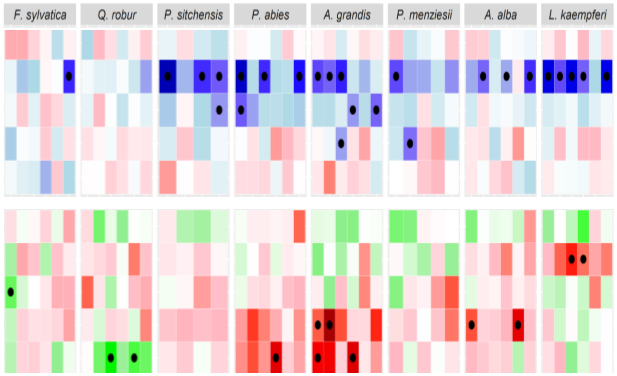Universitetsavisen
Nørregade 10
1165 København K
Tlf: 21 17 95 65 (man-fre kl. 9-15)
E-mail: uni-avis@adm.ku.dk
PhD thesis defense
PhD thesis defense — Climate responses in growth and wood anatomy of important forest tree species in Denmark
Date & Time:
Place:
Auditorium 'Landskab' P301, Front house 2nd floor, Department of Geosciences and Natural Resource Managament, Rolighedsvej 23, 1958 Frederiksberg C
Hosted by:
Section for Forest, Nature and Biomass
Cost:
Free
Summary:
The expected changes in global and regional climate, like drought episodes and increasing temperatures, are a challenge for forest management, as they will affect growth, mortalit y and species composition of future forests directly and mostly negatively. However, the long-term impacts of drought and high temperatures on the development of Danish tree species are scarcely investigated.
Through a dendroecological approach this dissertation assessed the growth responses related to increment, xylem anatomy and wood property of eight different important tree species, namely Picea abies (L.) Karst., Picea sitchensis (Bong.) Carr., Abies alba Mill., Abies grandis (Dougl.) Lindl., Pseudotsuga mensiesii (Mirb.) Franco, Larix kaempferi (Lamb.) Carr., Quercus robur L. and Fagus sylvatica L., to long-term drought and high temperatures, aiming at identifying a species portfolio matching future climate.
Based on the present results and supported by literature it is concluded that projected more severe and frequent drought episodes and higher autumn and summer temperatures will substantially affect the growth and xylem anatomy of most important temperate forest species and may change forest composition and decrease forest productivity. Q. robur is expected not only to tolerate the expected future climate including increasing water stress but also will presumably even prosper from the rising temperature. All other tested species are expected to have decreased growth and vitality, but to different degrees. The native F. sylvatica is expected to have decreased growth when periods of drought are getting more frequent. Among the imported conifer species P. menziesii is expected to have the highest degree of climatic adaptability/tolerance, whereas L. kaempferi and P. abies are ranked as the most climatic intolerant species, mainly due to their low drought tolerance (both species) and susceptibility to high autumn temperature (only P. abies).
Overall, this dissertation improves the understanding of how drought and high temperatures have impacted and will influence the growth of tree species in Danish forest, which can be used as inputs to forest management decisions regarding adaptation to an uncertain climatic future. It also demonstrates that old common garden trials can contain valuable information for addressing forest management issues on species portfolios to climate change.
The thesis is available for inspection at the PhD administration office 04.1.413, Øster Voldgade 10
